
A persistent show business legend, circa 1940, has it that every day a bus pulled up in Hollywood and 100 aspiring actors got off in the hopes of landing a starring role in movies at the iconic MGM, Warner Bros, Universal, Paramount or 20th Century Fox studios.
In what was the golden era of motion pictures, you could spot Marilyn Monroe, the Marx Brothers, Humphrey Bogart or Ronald Reagan rubbing shoulders with the rabble at Schwab’s Pharmacy on Sunset Boulevard.
“A stool at Schwab’s” was the place to be “discovered” and find a job.
Today, roughly 57 people move into the Greater Seattle area each day by plane, train, automobile or caravan. Amazon, Microsoft, Google, Facebook, Twitter, and dozens of other Internet brands, from Avvo to Zillow, are the gravitational forces behind this epic tech talent migration.
According to DMV and driver’s license data, most of the transplants come from California, followed by Texas, then Oregon, Florida and New York in that order. 8 in 10 newcomers have a college degree. Both Texas and California have rival tech hubs.

As for Hollywood, the “silver screen” has morphed into millions of LCD/LED screens featuring Seattle-made apps, games and Web services. The Academy Awards now honor films from a newcomer called Amazon Studios. There is no longer a single place to “be seen or make the scene,” unless of course, it is LinkedIn.
Some of the very same companies that made Silicon Valley the original tech capital of the United States have now firmly ensconced Seattle as their remote engineering center, and the Emerald City is extolled as America’s second tech capital. With the inclusion of aerospace companies like BlueOrigin, SpaceX and Boeing, many would claim the #1 spot for the I-5 and 405 corridors.
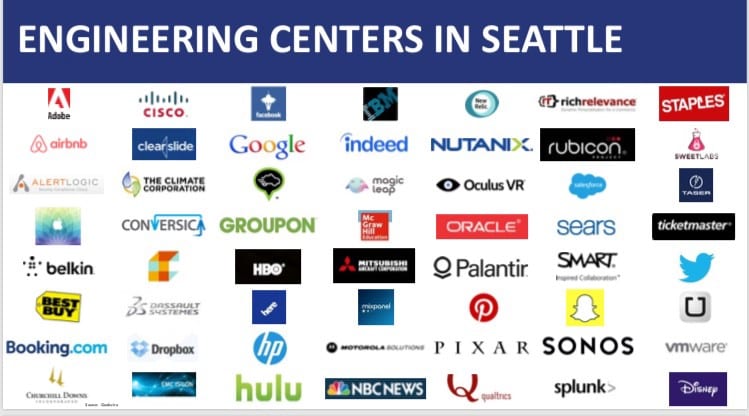
The job market is thriving in Pugetopolis and the repercussions are being felt everywhere, from unusual employee perks designed to attract and retain top talent, to flexible hours, telecommuting options, transportation support
In the “roof over your head” category, a relatively new breed of

To offer our readers an inside look on how to best compete for the most desirable career posts in this dynamic staffing environment, we turned to Megan Slabinski, District President for Robert Half, the global professional staffing firm. Based in Seattle, Megan oversees operations in Washington, Oregon
Seattle24x7: Seattle is experiencing a kind of HR Renaissance in attracting both growth-oriented tech companies and the talent that will fuel their expansion. How would you characterize this vibrant employment environment?
MS: I’d characterize Seattle as a competitive market with highly skilled professionals who are fluid in that they move around a lot in their professional careers. That’s both highly unique and very prevalent here in Seattle. People are constantly moving among companies, constantly seeking new professional challenges.
Seattle is also demanding, fast-paced and sets a high-bar for achievement. The strongest and most robust sectors in the Seattle tech world are in the software Internet space.
Seattle24x7: How has Internet access transformed the job search process?
MS: For recruiters and hiring managers, it’s easier than ever to find candidates to suit niche skills or even sway candidates who might not be actively job searching. Job seekers can even reach out directly to employers, create online profiles to attract recruiters, and apply for jobs with the click of a button.

Seattle24x7: Are Skype, Facetime and other teleconferencing protocols more prevalent in the new Internet environment?
MS: Yes, many of our clients conduct interviews through these tools in order to expedite the hiring process.
Seattle24x7: What is the average amount of time involved in being hired for a new job?
MS: In a survey by our company, 39 percent of workers said a hiring process lasting 7-14 days is too long. Twenty-four percent of respondents felt a timeframe of 15-21 days was too lengthy.
We encourage local employers to move quickly due to the candidate shortage in Seattle.
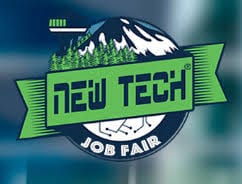
Seattle24x7: What is the likelihood that an employer in today’s marketplace will have performed an online search on a candidate using LinkedIn, Facebook or another social media site
MS: Very likely. In a 2017 survey by our company, sixty-three percent of executives said they search online for information about prospective employees at least some of the time. And if hiring managers don’t like what they see, applicants could be removed from the running. Almost half (48 percent) of executives have decided not to extend a job offer to a candidate based on what they uncovered online.
Seattle24x7: Has LinkedIn emerged as the most prominent social site for viewing a candidate’s profile, connections and endorsements by colleagues? If so, would it be your recommendation for candidate to create and/or groom their LinkedIn profiles?

MS: Yes, LinkedIn is the primary site for professional networking. We encourage all job seekers to create and maintain a LinkedIn profile. Make sure it is updated with your latest jobs, skills and certifications. Some tips to stay active are posting news stories relevant to their industry, engaging in conversations with others in their network and asking for recommendations from former coworkers.
How to Land a Freelance
Job in Seattle
Seattle has a bustling freelance market- place for those who are self-employed and looking to go it alone or team up
For the latest insights, we asked Denis Du Bois, chief B2B marketer at P5 Group and founder of the Freelance Seattle Meetup group for his “How-To’s.”
· Specialize. Be the best of the best at what you know, and stick to that.
· Consider whether you want to build your own freelance
· Agencies find clients for you. They own the client relationship and keep a portion of the fees.
· Starting a freelance business is feast-and-famine by nature. Have 12 months of expenses in savings.
· The freelance marketplace is crowded. Plan to promote yourself heavily in the first couple of years.
· When establishing your freelance rates, remember that you’ll pay your own health insurance, employment taxes
· The freelance life offers independence but not the built-in social interaction of a workplace. Make time to socialize.
Seattle24x7: What do you advise job candidates to do in managing their social media profiles before applying for a position?
MS: A number of things…First, be careful what you share. “What happens on the Internet, stays on the Internet.” Whether it’s an unflattering photo or an off-putting remark, the saying rings true. Use discretion when publishing content online, including social media.
Next, put your skills on display. Showcase you work and passion projects, and include a link on your resume.
Offer your insights. Show that you know your stuff by commenting in relevant forums or authoring online articles in your area of expertise. Doing so helps establish your credibility and dedication to the industry.
It’s important to moderate your content. While a sparse online presence may be underwhelming, hiring managers don’t need to know everything about you. Sharing too much information can cause employers to question your focus and character.
Stay on top of the task. Building and managing your digital footprint shouldn’t be limited to when you’re job hunting. Protect your professional reputation at all times to ensure you’re always putting your best self forward.

Seattle24x7: Which positions in the high tech sector have shown the most explosive growth in terms of demand? How do Seattle’s salaries compare to the national average?
MS: Let’s look at the midpoint salaries for in-demand positions in 2019: (the Seattle numbers are in the right-hand column).
| Position | Midpoint Salary | Seattle Salary |
| Business Intelligence Analyst | $106,000 | $132,500 |
| Chief Security Officer | $181,750 | $227,188 |
| Data Scientist | $121,500 | $151,875 |
| Database Developer | $118,000 | $147,500 |
| Desktop Support Analyst | $61,250 | $76,562 |
| DevOps Engineer | $110,500 | $155,625 |
| Lead Applications Developer | $125,000 | $156,250 |
| Network Administrator | $89,000 | $111,250 |
| Network Security Engineer | $118,000 | $135,938 |
| Systems Administrator | $81,750 | $115,938 |
The Job Search
Seattle24x7: When is the best time to apply for a job — when you are already employed by a company in a current job or after you have departed from a role or are otherwise unemployed?
MS: In a survey by our company, 78 percent of workers said they would feel at least somewhat comfortable looking for a new job while employed. More than six in 10 respondents (64 percent) indicated they’d likely conduct search activities from work.
However, looking for a new opportunity during business hours can be risky and potentially threaten current job security. While it’s OK to pursue new opportunities while employed, a search should never interfere with your current job. Schedule interviews during lunch breaks or outside of business hours, and avoid posting anything on social media that indicates you’re on the market.

Seattle24x7: If you are an active job seeker, what is the number of new job applications it is practical to submit to place the odds of landing an interview in your favor?
MS: As a general rule, the more often you customize your application to the position, explain how your background and experience are a good fit for the role, express your interest in the company, the better your chances will be of landing an interview.
Seattle24x7: Given the competitive nature of the Seattle job market, what extra steps should candidates take to win attention?
MS: Stay active, seek out contract work in between positions, keep certifications and skills up-to-date. Network regularly and ensure you tailor each application to the individual opportunity.
The Job Application
Seattle24x7: That’s a perfect segue to the next question. You’ve alluded to the answer already. Is it best to create one master CV or resume for every job application, or to customize a resume for every job?
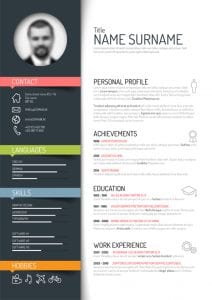
MS: Yes, it’s better to customize application materials for every opportunity. In a survey by our company, one-third of executives said the most common mistake people make in application materials is failing to customize them for the position; 24 percent of executives said typos or poor grammar are the most frequent blunders.
Seattle24x7: What is the most common omission or misstep on a job application or resume?
MS: In a survey by our company, almost half of workers (46 percent) polled said they know someone who included false information on a resume. Job experience (76 percent) and duties (55 percent) were cited as the areas that are most frequently embellished.
The Job Interview
Seattle24x7: Is it perfectly okay for an employer to provide a sample assignment to gauge the performance of a candidate regardless of the time involved? Is this practice any more prevalent in tech interviewing?
MS: Managers can give code tests but they can’t ask candidates to create work product without paying them for their time. There is a fine line between a test and a finished product that requires compensation.
Seattle24x7: Several local, high tech companies have earned a reputation for asking unusual questions in an interview to challenge a candidate or gauge analytical skills and intellectual acumen. Without disclosing any company by name, can you recite a particularly thought-provoking question or exercise you have heard about that arose in an interview?
MS: How many tennis balls could we fit in this room?
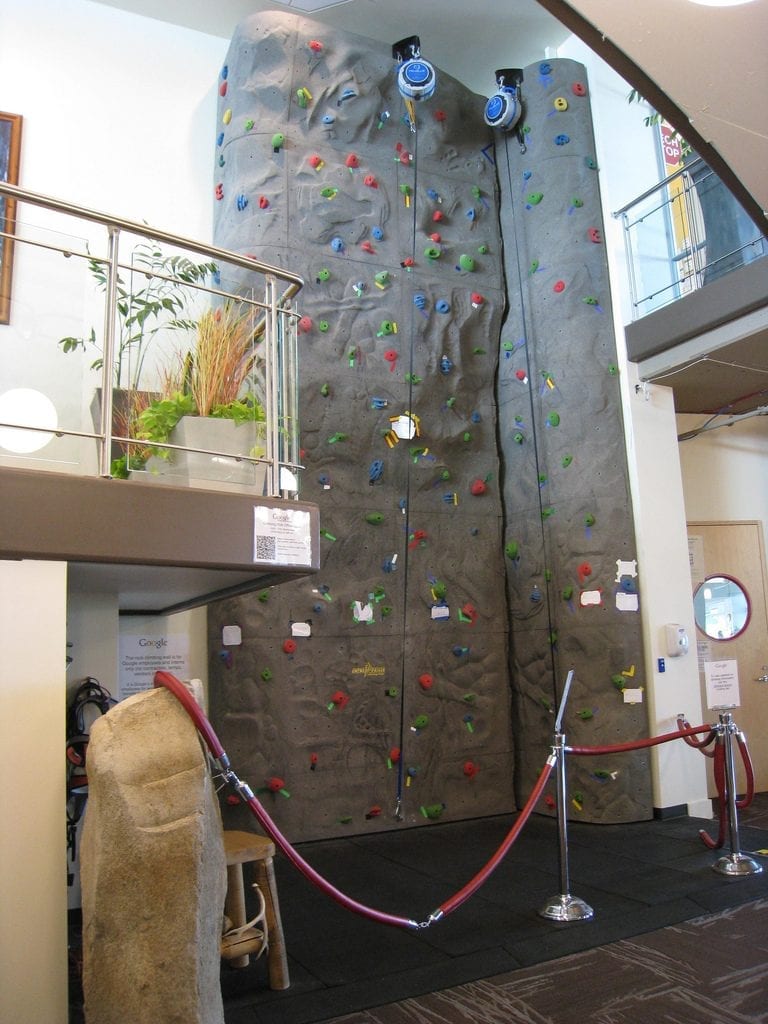
Seattle24x7: Hahaha!
MS: Often, candidates are thrown off guard by offbeat questions, as they aren’t usually found in a list of interview tips. A question like this is meant to test critical-thinking abilities, problem-solving skills and poise, not a specific number.
Perks at Work
Seattle24x7: To what extent are job benefits ever negotiable by a candidate?
MS: Job seekers are confident in their bargaining power. In a survey by our company, more than half of professionals surveyed (55 percent) tried to negotiate a higher salary with their last employment offer, a 16-point jump from a similar survey in 2018.
A separate survey finds many employers are willing to make a deal with candidates: 70 percent of senior managers said they expect some back-and-forth on salary. About six in 10 are more open to negotiating compensation (62 percent) and nonmonetary perks and benefits (59 percent) than they were a year ago.

Job seekers with specialized skills are in high demand and may even be entertaining multiple offers. With the odds in their favor, it’s little wonder more professionals are comfortable negotiating not only salary but also non-monetary benefits, such as vacation days, flexible schedules and professional development.
Smart companies realize that winning over top candidates often comes down to moving quickly on hiring decisions and presenting a compensation and perks package that’s at least on par with the competition. Negotiations can be nerve-wracking for both employers and workers; tapping resources like a recruiter and salary reports helps take some of the guesswork out of these discussions.
Seattle24x7: Are there any conditions when an employer must provide relocation assistance to a candidate?
MS: It depends on the company, but we do know that offering relocation benefits in today’s job market could be a good move for employers. Sixty-two percent of workers surveyed said they would consider moving for a position.
A separate survey found that in the past five years, 34 percent of companies have increased what’s offered in the relocation packages they present to top candidates outside their geographic area. In contrast, 30 percent of organizations do not offer any incentives for moving.
Seattle24x7: What special perks exist for tech employees that are not typical for non-tech workers?
MS: We’re finding that in a tight job market Seattle workers are expecting non-monetary perks that will allow them to have that

These could include bringing their pets to work, catered lunches, happy hour collaborative team activities, gym memberships, public transportation reimbursement and passes and flexible hours to avoid heavy long commutes. These are cecoming the norm when it comes to added perks.
We’re seeing that many companies are offering unlimited time off where they trust employees will take time off when needed and continue high productivity to meet business goals.
Tech workers also want access to the latest tech computer hardware and software and companies are making sure they are equipped with the latest tools for their teams. Wireless headsets and standing desks are what tech professionals are equipped with in the workplace.
Seattle24x7: We hear about Seattle companies offering snacks and refreshment bars, breakfast foods, gourmet coffee, microbrew beer, massages and special merchant/product showcases. Others offer dog-friendly environments including in-house dog walkers.
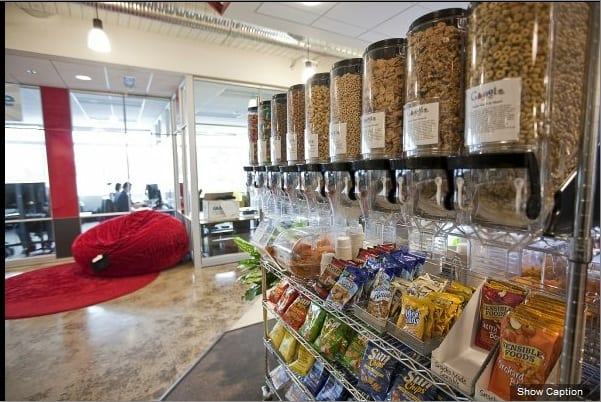
MS: This list covers what we see most often. They are all great ways to attract candidates Consider what is going to keep employees for the long term – flexibility, professional development and learning opportunities are important.
A CIO survey by our company found the following incentives ranked highest among tech workers:
- The ability to learn and grow
- The opportunity to work on interesting projects
- Bonus or stock options
- Advancement opportunities
- Vacation time
- Using new and innovative technology
- Having a unique office environment or other office perks
- Remote working options
Seattle24x7: It has been said that most individuals will have as many as 5-6 different “careers” in their lifetimes? What lateral mobility, if any, has been shown to exist in the tech sector?

MS: The tenure tide is shifting, and substantially more workers — especially those from younger generations — see rewards in job hopping than before. Sixty-four percent of professionals polled think changing roles every few years can be beneficial, with the biggest perk being a higher salary.
While frequent job changes may be more common in today’s technology workforce, some employers are wary of hiring applicants with a long list of short stints. Hiring and onboarding a new employee takes significant time and
Seattle24x7: What are the unique benefits of being a temporary
MS: Our temporary professionals tend to be highly specialized. They generally earn well above minimum wage – our skilled professionals in areas like tech and finance may earn more through consulting work than they would in full-time jobs.
At lower skill levels, temporary jobs can provide a paycheck to those who might not otherwise be able to find employment. These roles serve as a resume
Additionally, temp work affords you time and flexibility – you decide which assignments to accept and decline, adjusting your schedule according to your current priorities. Temporary work can provide valuable experience that can enhance your resume and portfolio. Professionals can expand their business network through the different assignments they pursue.
Seattle24x7: Is there any justification for compensating a contract employee with lower pay and benefits compared to staff positions?
MS: On an hourly basis, temporary workers often earn as much or more than their full-time counterparts. This is particularly true at the upper levels – that may be why we’re seeing an increasing number of management-level professionals decide to start consulting careers. They find they can bring their expertise into a company and get paid well for it.
There is no incentive to pay temporary candidates a wage that doesn’t meet their requirements or skill level. Staffing firms rely on candidates who are pleased with their services and who feel they are paid fairly for their work. In addition, Robert Half provides our temporary professionals access to benefits such as health insurance, vacation pay and bonus pay. [24×7]
Megan Slabinski is the District President for Robert Half and oversees operations in the Pacific Northwest for the company’s Robert Half Technology and The Creative Group divisions. She has held numerous leadership roles within the company, including Regional Vice President and Executive Director of The Creative Group. A veteran of the staffing industry, she has helped place thousands of professionals in rewarding careers and has provided local businesses with the talent they need to be successful. She is a graduate of


















